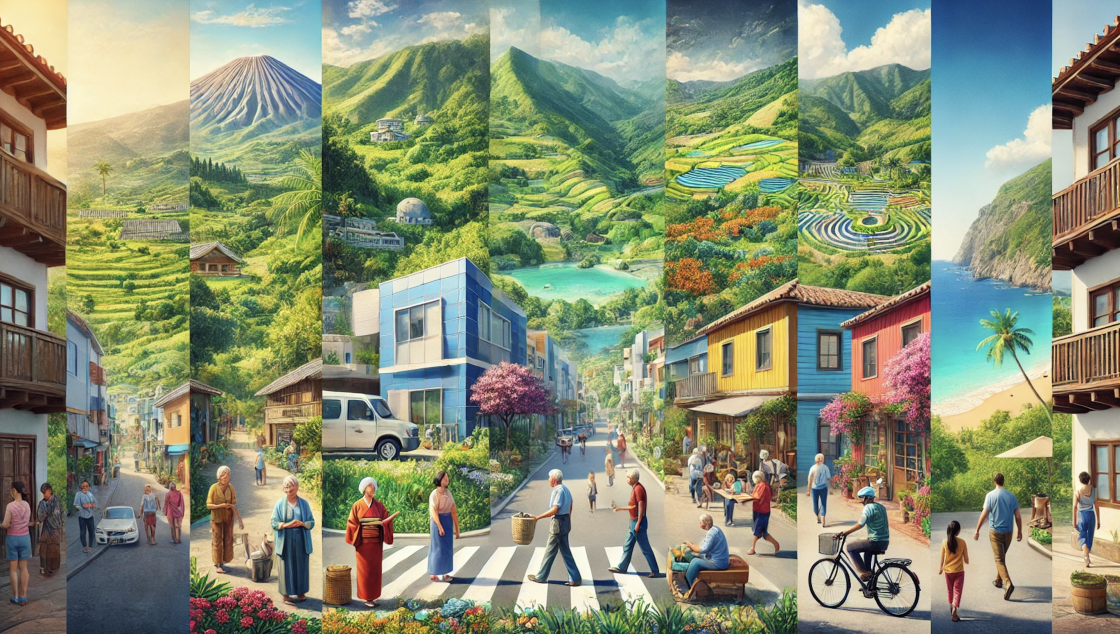In several parts of the world, there are communities where people regularly live beyond 100 years with minimal health issues. These areas, known as Blue Zones, have drawn the attention of researchers who seek to understand the lifestyle habits that contribute to such longevity. The concept of Blue Zones was introduced by Dan Buettner in collaboration with National Geographic, identifying regions where the population enjoys a notably high life expectancy and reduced rates of chronic disease.
This article will explore the secrets of Blue Zones, detailing their characteristics and revealing how residents of Metro Vancouver can incorporate these life-extending principles into their daily routines.
What Are Blue Zones?
Blue Zones are areas where people tend to live significantly longer, often surpassing 100 years of age, while maintaining good health and vitality. These regions are scattered across the globe and share certain lifestyle traits that promote longevity.
The five officially recognized Blue Zones are:
Although they vary in location and culture, these regions share common practices and environmental factors that foster long, healthy lives. Let’s dive deeper into each one.
The Five Blue Zones: Unique Characteristics of Longevity
Okinawa, Japan: A Balanced Life
Okinawa is known for its exceptionally high number of centenarians. The traditional Okinawan diet includes fresh vegetables, tofu, fish, and rice, while they limit processed foods and sugar. An important practice in Okinawa is “Hara Hachi Bu“, the habit of eating until you are 80% full, which helps prevent overeating. The Okinawan lifestyle is also marked by strong social connections, physical activity through daily tasks, and a deep sense of purpose known as “Ikigai“, or reason for living.
Sardinia, Italy: Strong Community Bonds
In the Sardinian region of Barbagia, the key to longevity lies in strong familial and social bonds. Sardinians lead active lives, often working on farms or shepherding well into old age, and follow a Mediterranean diet rich in whole grains, legumes, and dairy products like pecorino cheese. Family support systems, including multi-generational households, help reduce stress and foster a deep sense of belonging. These connections play a significant role in their long and healthy lives.
Nicoya Peninsula, Costa Rica: Simple and Purposeful Living
Nicoya’s centenarians enjoy a simple lifestyle that emphasizes regular physical activity and a strong connection to nature. Their diet consists mainly of beans, corn, and locally grown fruits. The region’s water is naturally rich in calcium and magnesium, promoting bone health. Additionally, Nicoyans possess a “Plan de Vida,” or life plan, which gives them a strong sense of purpose. Their clear daily goals and involvement in community life contribute to their long life expectancy.
Ikaria, Greece: A Slower Pace of Life
On the Greek island of Ikaria, residents live remarkably long and healthy lives, largely free of dementia and chronic disease. The Ikarian diet includes vegetables, legumes, and olive oil, reflecting the Mediterranean pattern of eating. Daily life in Ikaria is relaxed, and residents often take naps in the afternoon, which helps to manage stress. Close-knit social circles and a deep-rooted sense of tradition and family provide emotional support, contributing to their longevity.
Loma Linda, California: A Faith-Based Focus on Health
Loma Linda is home to a large community of Seventh-day Adventists, whose religious beliefs emphasize health and wellness. The Adventists follow a lifestyle that includes regular exercise, abstinence from alcohol and tobacco, and a well-balanced diet. Their strong sense of faith and purpose, along with regular social engagement within their religious community, provides emotional and mental resilience, contributing to their long and healthy lives.
What Makes Blue Zones Special?
Although Blue Zones vary in geography and culture, several common themes emerge from their populations’ lifestyles that contribute to their impressive longevity. These include:
Eating in Moderation
In Blue Zones, people eat mindfully and often follow cultural practices that encourage portion control, such as Okinawa’s “Hara Hachi Bu.” This helps prevent overeating and maintains a healthy body weight, which is a key factor in preventing chronic diseases.
Natural Physical Activity
People in Blue Zones are naturally active in their daily lives. Rather than engaging in structured exercise routines, they incorporate movement into their routines through activities like walking, gardening, and manual labor. This consistent, low-intensity physical activity keeps them fit without the strain of high-intensity workouts.
Strong Social Ties
A sense of community is a central feature in all Blue Zones. Close relationships with family and friends provide emotional support, reduce stress, and foster a strong sense of belonging. Social engagement is a key contributor to mental health, which in turn influences physical well-being.
Sense of Purpose
Having a clear sense of purpose, known as “Ikigai” in Okinawa and “Plan de Vida” in Nicoya, is common among Blue Zone inhabitants. A sense of purpose gives people motivation and direction, which helps them stay mentally engaged and emotionally satisfied as they age.
Stress Management
Residents of Blue Zones have regular practices that help them manage stress, such as afternoon naps in Ikaria, prayer in Loma Linda, or simply enjoying time with loved ones. These habits help lower cortisol levels, reducing the risk of chronic illnesses associated with long-term stress.
How Metro Vancouver Residents Can Apply Blue Zone Principles
Although Metro Vancouver may not be a Blue Zone, there are several ways to apply the principles of these long-living communities to promote a healthier, more fulfilling life.
Practice Mindful Eating
Rather than focusing on specific dietary rules, consider practicing moderation when you eat. Avoid overeating by listening to your body and stopping when you’re about 80% full. By practicing portion control and reducing processed food intake, you can improve your overall health.
Stay Physically Active Every Day
While structured workouts are beneficial, daily movement is just as important. Incorporate regular physical activity into your routine, such as walking, cycling, gardening, or other light physical tasks. The key is consistency and natural movement rather than high-intensity exercise.
Strengthen Your Social Network
Prioritize relationships with family, friends, and community members. Make time to nurture these bonds, whether it’s through weekly gatherings, shared meals, or regular phone calls. A strong social network can offer emotional support, reduce stress, and improve mental well-being.
Find Your Sense of Purpose
Identify what drives you, whether it’s your career, hobbies, volunteering, or family life. Having a sense of purpose can help you stay engaged and give you a reason to maintain healthy habits. Reflecting on what gives your life meaning can enhance both your emotional and physical health.
Manage Stress Effectively
Stress is an unavoidable part of life, but managing it well can significantly impact your health. Incorporate stress-reducing practices into your daily routine, such as meditation, yoga, spending time in nature, or taking short breaks throughout the day to rest and reset.
Living a Longer, Healthier Life in Metro Vancouver
While Blue Zones may be located in remote parts of the world, their principles for healthy living are universal. By practicing mindful eating, staying active, fostering strong social ties, maintaining a sense of purpose, and managing stress effectively, residents of Metro Vancouver can enhance their quality of life and improve their chances of living long, fulfilling lives.
Incorporating even a few of these habits into your daily routine can make a substantial difference, promoting not only longevity but also a higher quality of life at any age.


